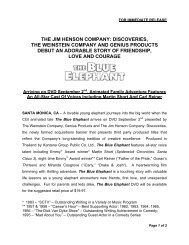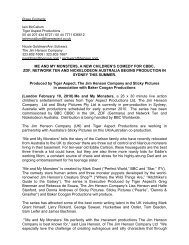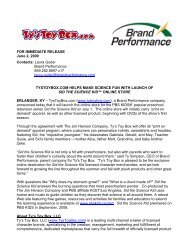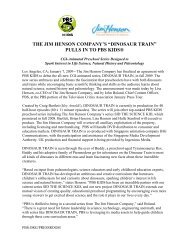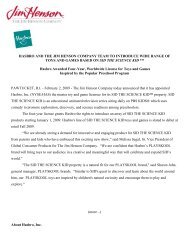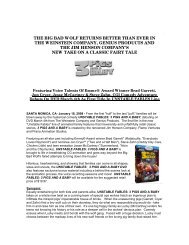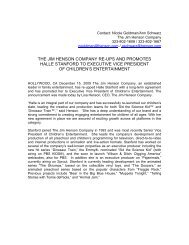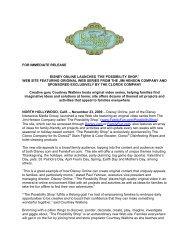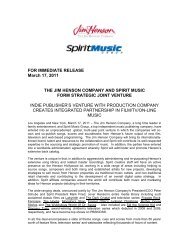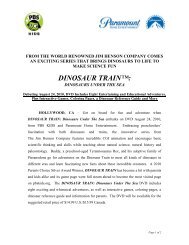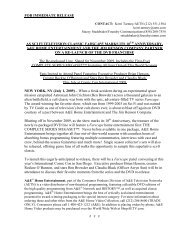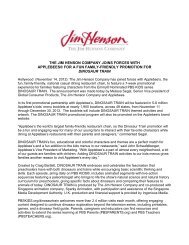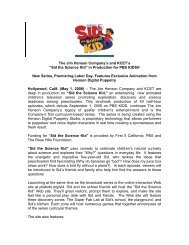An Interview with Lisa Henson - 2005 - The Jim Henson Company
An Interview with Lisa Henson - 2005 - The Jim Henson Company
An Interview with Lisa Henson - 2005 - The Jim Henson Company
- No tags were found...
Create successful ePaper yourself
Turn your PDF publications into a flip-book with our unique Google optimized e-Paper software.
<strong>An</strong> <strong>Interview</strong> <strong>with</strong> <strong>Lisa</strong> <strong>Henson</strong> - <strong>2005</strong>1. How does the <strong>Company</strong>’s prolific history and – more specifically – <strong>Jim</strong> <strong>Henson</strong>’s legacy influence the choicesmade about management and new production?We have paid a lot of attention to taking care of <strong>Jim</strong> <strong>Henson</strong>’s legacy and the company itself is the most concretepart of that legacy. This is the company that he ran, and if somebody else were to come in and be assigned to bethe chairman of <strong>The</strong> <strong>Jim</strong> <strong>Henson</strong> <strong>Company</strong> and none of us were involved -well, I know it could happen, and we mayall think it’s a great idea in five or ten years, but right now I can’t even imagine, because its been such a closely heldcompany for all this time.Yet we don’t think of our job as just about history and the past. We try as hard as we can to make it about the newwork here, and the responsibility sits comfortably on our shoulders that the new work is going to fit <strong>with</strong> the oldwork. We don’t second guess ourselves or wonder if what we’re doing works for <strong>The</strong> <strong>Jim</strong> <strong>Henson</strong> <strong>Company</strong> becausewe know that it does. Unconsciously, I think both Brian and I as well as our siblings have a very natural understand ofwhat fits, what doesn’t fit, what would have been exciting for <strong>Jim</strong> <strong>Henson</strong> if he were alive today. <strong>The</strong>re isn’t a lot of‘What would <strong>Jim</strong> do’? <strong>The</strong>re is a balance between respecting where the company came from but understanding thatit’s moving forward.<strong>An</strong>d questions do come up sometimes. Like <strong>with</strong> computer animation. Why are the creators of the Muppets, <strong>The</strong> <strong>Jim</strong><strong>Henson</strong> <strong>Company</strong>, switching partially from puppetry to animation? Are we just being trendy? <strong>The</strong> truth is that thereis a historical interest in this area going all the way back to my father’s specific articulation of his desire to puppeteerCG characters. <strong>An</strong>d after years of research, he executed that vision in the MuppetVision 3*D movie at Disneyworld<strong>with</strong> the Waldo character. <strong>The</strong> puppeteered animation that we now do is really something that I believe he wouldhave accomplished over time through his intense desire to produce in that medium. It was something he fully envisionedbut the technology wasn’t entirely there for it yet.<strong>The</strong> company has continued to develop his idea, continued to plug away at it for visual effects, commercials andvideo games. <strong>An</strong>d now finally we have the <strong>Henson</strong> Digital Performance System that can puppeteer CG characters inreal time for television and film, for fully animated shows. But the theory of it was, I believe, completely articulatedby <strong>Jim</strong>. He was so interested in what was still to come in terms of technology. I spent weeks talking to him about interactivetechnology - trying to produce interactive programs at a time when it could not be done. His vision of whatthe company should be doing was extremely modern and futuristic and we are now using the exact the technologicalcapabilities right now that he wanted to have in 1989.2. With the <strong>Company</strong> currently celebrating its 50 th year, what do you see in the future for <strong>The</strong> <strong>Jim</strong> <strong>Henson</strong><strong>Company</strong> in the next 50 years, especially given the recent franchise sales?I think that the creation of the Bear in the Big Blue House franchise is a good model of how something original thatis not Muppets, that uses all the best of <strong>The</strong> <strong>Jim</strong> <strong>Henson</strong> <strong>Company</strong>’s talent in development, in performance and indesign, can take off pretty quickly. So our hope would be to not only work <strong>with</strong> the old franchises, but put a lot ofour efforts into developing new franchises, like Frances, based on the Russell Hoban books. Since these books areso well-known, like Bread and Jam for Frances and Bedtime for Frances, we think she and her family are an incrediblefranchise for the future. It’s a preschool property that Alex Rockwell is working on <strong>with</strong> Brian and a lot of familiar<strong>Henson</strong> faces are involved <strong>with</strong> it behind the scenes. What it looks like on the surface is animation, which is a wholedifferent way for us to watch new characters. But it is our puppeteered animation and uses all puppeteer talent forvoices and performance.In development we’re focusing on just two areas which are family entertainment and fantasty/sci-fi. But in all mediaand whether it be in puppetry, animation or live action, the focus will be on fun, innovative entertainment. People
have an expectation for <strong>The</strong> <strong>Jim</strong> <strong>Henson</strong> <strong>Company</strong> that it’s going to provide entertainment for the whole family, and ifeven if its preschool, I think people kind of expect our work to play on two levels and be interesting to adults as well.We are also putting emphasis on more development for older kids. We haven’t had a major television series aimed atolder kids for a long time, so we definitely intend to reach kids of all ages. <strong>An</strong>d for older audiences our emphasis is onfantasy and on sci-fi. Whether it’s the historic titles that we have like <strong>The</strong> Dark Crystal and Labyrinth or the more recentsci-fi hit Farscape, or the upcoming MirrorMask, we have fans and credibility in the areas of fantasy and sci-fi and wedon’t want to disappoint them. <strong>The</strong>se titles feature complex, fantastical, interesting worlds and we’re developingfeature films, television shows, and all kinds of things in that area.3. Can you comment on the company’s current creative environment?Well, for example, MirrorMask’s screenplay is by graphic novelist Neil Gaiman. Every book that Neil has written hasbeen optioned for film or television. Mirrormask is his first produced title so we believe that his fans will be both excitedand gratified to see it. It was directed and ultimately handmade in the most incredible fashion by his illustrativepartner Dave McKean. Neil and Dave are - like Brian Froud was at the time of <strong>The</strong> Dark Crystal and Labyrinth - talentfrom outside of our company whose work is very sympathetic <strong>with</strong> what <strong>The</strong> <strong>Jim</strong> <strong>Henson</strong> <strong>Company</strong> has been doing foryears. <strong>The</strong>re is a creative excitement about teaming up <strong>with</strong> these kinds of fantasy talents.In the case of Mirrormask, Dave has succeeded in making an incredibly personal film that is completely unlike anythingyou’ve ever seen before. While he had a very modest budget to work <strong>with</strong>, he also had the advantage of workingin an atmosphere of tremendous freedom and appreciation for his artistry. We set that up for him through ourdistribution deal <strong>with</strong> Sony in such a way that it could be a full flowering of his talent. <strong>An</strong>d to do really good fantasy,people have got to be allowed to let loose. If you look back on <strong>The</strong> Dark Crystal, it’s amazing that such a strangething was ever allowed to be. At the time, someone believed in <strong>Jim</strong> <strong>Henson</strong> and he believed in Brian Froud and it wasan extreme flowering of their imaginations. <strong>An</strong>d I think we have an appreciation for that kind of thing and a desire tohelp people realize those visions.4. In 2004, <strong>The</strong> Walt Disney <strong>Company</strong> purchased the Muppet and Bear in the Big Blue House brands from<strong>Henson</strong>, a decision that surprised some fans. Why did <strong>The</strong> <strong>Jim</strong> <strong>Henson</strong> <strong>Company</strong> sell these rights and how doesthis relationship work now?We sold the Muppets to Disney because we all had wanted to make the sale back in 1989 when <strong>Jim</strong> <strong>Henson</strong> wasalive. It was such a dream of our father’s to have the Muppets live at Disneyworld and Disneyland. <strong>The</strong>y took such verygood care of their own characters, and they actually have a sense of quality control around them, that they’re not justsoaking every nickel from each franchise in a short term way, but creating characters that live on, and on and on.Some children might not know where Tinkerbell comes from. <strong>An</strong>d probably not where Mickey Mouse comes from,but they know the characters. So that seemed like the right kind of a future for our characters. That they would standalone; immortalized personalities that could be used in any kind of medium and they wouldn’t be tied to the successor failure of distribution rights of <strong>The</strong> Muppet Show, or <strong>The</strong> Muppet Movie, but that they could continue on in thepublic’s eye.In terms of why it was a sale, we have enjoyed on and off over the years doing business <strong>with</strong> Disney. Some of our mostsuccessful movies were done <strong>with</strong> Disney: Muppets Treasure Island and Muppet Christmas Carol, as well as television<strong>with</strong> Muppets Tonight and Dinosaurs. Every experience that we had production-wise <strong>with</strong> the Disney <strong>Company</strong> wasalways positive... and yet it always did feel that the Disney <strong>Company</strong> worked harder for its own characters. <strong>An</strong>d ascongenial as the production relationships were, Disney’s own characters are ultimately their main priority.So we always had that dream that they could come together. <strong>An</strong>d it seemed like they never could because of thefailed transaction in 1990, and then again another attempt to buy the characters in after that. <strong>The</strong>re were also discussionsbetween Walt Disney and EMTV, the German owners, and at every point it seemed like in spite of our bestintentions - mutually - to make this transaction happen, it wasn’t going to happen. So it became the ‘holy grail’ of ourbusiness transactions. <strong>An</strong>d finally it did work out last year.
Now we have a producing deal <strong>with</strong> Disney for the Muppets and we just finished Muppets Wizard of Oz which I think,as our first production, represents a very strong collaboration <strong>with</strong> ABC, and Disney. <strong>The</strong>y had been quite interestedin the property before the acquisition of the Muppets so it gave us a bit of a head start. We were able to move intoproduction on it very quickly after the acquisition because essentially the movie was completely developed. One ofthe things we hope to do in the early period of production <strong>with</strong> Disney is provide them <strong>with</strong> some initial concepts forfuture films, TV series and reality television ideas. We see ourselves as kick-starting the Muppets at Disney.For our company, even now that we have sold the Muppets to Disney, Muppet production will still be a priority forus because there is a lot that we have to offer in terms of production and also our consulting on other aspects of theMuppet business. We’re more than included in the process, we’re really working <strong>with</strong> the Muppets Holding <strong>Company</strong>on the production side of things.5. Let’s back up a bit. In 1999, why did the <strong>Henson</strong> family sell the company to EMTV and then later buy it back?Well I think that my father always had a medieval notion that all of his children would be apprenticed to differentparts of the business and take it over as a group and run it as a group while each worked in a different area. Brian wasschooled in all the technology as well as puppetering and directing. Cheryl worked in several areas but most of thetime was encouraged to take a leadership role in the workshops and puppet building. <strong>An</strong>d I was methodically taughteverything there is to know about producing and development and so on <strong>with</strong> John and Heather. I think that he didwant us to run the company together, at the same time he wanted to sell the company to Disney. <strong>An</strong>d I think that itwas, in a funny way, a conflicted notion which we’ve played out quite accurately.In 1999, <strong>The</strong> <strong>Jim</strong> <strong>Henson</strong> <strong>Company</strong> was a fairly large company that had distribution, licensing, and publishing departments.We were doing our own distribution and we had also made a few acquisitions. We were in the process of gettingbigger. We had bought half of an international cable channel and an American channel called Odyssey, which isnow the Hallmark Channel. We were at a crossroads where we had to decide if the company was going to get biggerand continue acquisitions and perhaps take on more of our own distribution and financing and grow into a major Hollywoodcompany or instead become a smaller production company again- which it had been not so very long ago. Wefelt at that time that we would prefer for it not to be in our hands to take it on the big track. <strong>An</strong>d in selling it to EMTVwe felt we were making the choice of making the company bigger by aligning <strong>with</strong> a foreign entity, which seemed verywell financed. Since they were also leaving management in place here it seemed like a combination between a sale ofa company and a merger, because the management was all still here and intact. We felt that we were going to accesstheir financing for television as well as their output deals, along <strong>with</strong> their German television block. That was taking theroute of going bigger. What happened <strong>with</strong> EMTV is well known and has been reported on in many places. As a resultof their financial situation, they had to sell <strong>The</strong> <strong>Jim</strong> <strong>Henson</strong> <strong>Company</strong> to raise money for their debt and in that environmentthey weren’t necessarily negotiating from the strongest place as a seller for the company.We were on the sidelines of the sale, although actually still in our offices here at <strong>Henson</strong>, but ownership-wise, we wereon the sidelines watching various buyers come through. As this went on, several buyers almost bought the companyand we (the family) would have been satisfied <strong>with</strong> the outcome because they were fairly major organizations, importantand well-rounded organizations, but the transactions didn’t happen. So at a certain point we thought, this is goinginto a very uncertain territory. <strong>The</strong>re were rumors of various buyers, but the buyers were not major Hollywood studios.We felt that we could just buy it back in that case and it would be a good business transaction as well as the right thingto do.After we bought the company back we pursued making it smaller even more seriously because the medium size didn’twork. It was an awkward size. In today’s Hollywood environment most of the entertainment is produced by a largestudio owned by another conglomerate, or a very small independent company. At this point we’ve opted to become asmaller supplier/production company, and we’re really happy <strong>with</strong> the choice.



